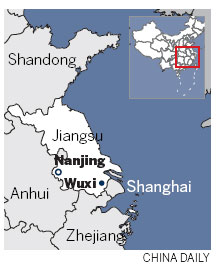Legislators from Wuxi, a center of traditional culture in Jiangsu province, aim to boost traditional and local culture through innovations of their own.
The move comes with the Yangtze River Delta region awash in the latest wave of Western and modern culture - a multibillion-dollar investment in an entertainment complex by Dalian Wanda Group, for example, and Shanghai Disneyland set to open in 2015.
"The survival of traditional Chinese culture relies on innovation, but we Chinese have not done enough in this regard," said Wu Guoping, chairman of Wuxi Lingshan Cultural Tourism Co and a deputy to the National People's Congress.
"Both the panda and kung fu come from China, but it was Hollywood that created the popular animated film Kung Fu Panda," Wu said. "This phenomenon is worthy of our reflection."
His comments come as Wuxi's government continues its efforts to boost tourism in a city that counts itself among the birthplaces of China's modern industry and commerce.
The key for traditional cultural tourism's success is to make it appeal to ordinary people, "the increasingly picky ones", Wu said.

Over the past two decades, Wu's company has transformed a barren hill into the Lingshan Buddhist scenic area, which draws about 3 million visitors annually.
"There are so many famous man-made cultural landscapes across China, such as the Great Wall and the palace at the Forbidden City, so we need to have a new approach," Wu said.
He is taking several initiatives to ensure this. For example, he said, "We promoted a 'trip of filial piety to Lingshan' targeting senior citizens and their families, because respect for one's family is a tradition deeply rooted in China."
Cultural tourism of this nature can contribute to a more vibrant city, Wu said, noting that the Lingshan site created about 1,000 jobs for nearby farmers and another 3,000 jobs for others.
Zhu Hong, a deputy chief in Shanlian, a village in Wuxi, said she was considering targeting more senior travelers from Northeast China and from abroad to enjoy the village's traditional rural culture.
Wealthy farmers now have houses available to share with visitors in a bed-and-breakfast setting. Farmers and visitors can live with each other, dining and even working together, Zhu said.
"I believe our natural village is a good choice for retired elderly people from the chilly northeast in winter, since many of them may be tired of Hainan," Zhu said, speaking of China's southernmost winter retreat.
"We also have an eye on more foreign visitors who want to see traditional Chinese rural culture, especially south of the Yangtze River. We've organized activities such as photography and fishing competitions for them, for instance," she said. "These have proved successful."
Zhu said seven families in the village have started live-in programs for visitors since April 2013, and many foreigners who are looking for this kind of experience, particularly from France and New Zealand, have made trips there.
zhaoshengnan@chinadaily.com.cn
